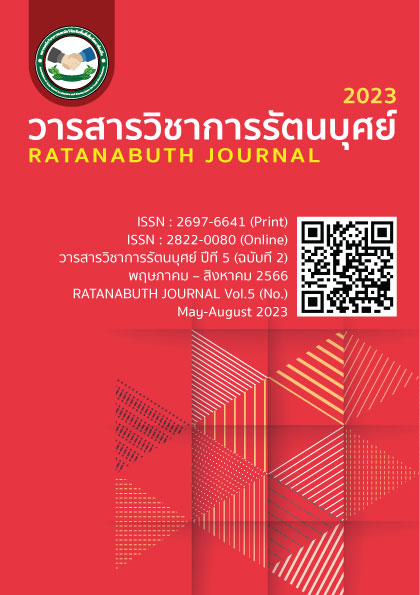Factor Affecting Environmentally Responsible Behaviors of Secondary school Student 3 under the Office of Secondary Educational Service Udon Thani Factor Affecting Environmentally Responsible Behaviors of Secondary school Student 3 under the Office of Secondary Educational Service Udon Thani
Main Article Content
Abstract
The purposes of this study were 1) to study the level of student’s environmentally responsible behaviors and the level of the factors effecting on student’s environmentally responsible behaviors 2) to study the relationships between the factors effecting and student’s environmentally responsible behaviors 3) to study the factors effecting on student’s environmentally responsible behaviors and make the equation for prediction student’s environmentally responsible behaviors. The samples were 420 students from secondary school under the Office of Secondary Educational Service Udon Thani. Data collected by the rating scale questionaries and the environmental knowledge test. The data were analyzed by Mean, Standard Deviation, Pearson’s product moment correlation coefficient and Multiple regression analysis. The results were as follows: 1) The secondary 3 school students under the office of Secondary Educational Service Udon Thani had environmentally responsible behaviors at moderate level. They had environmentally responsible behaviors in resource actions at high level. Citizenship actions, consumption, instrument usings, waste reductions and environmental activities in moderate level. As for the level of factors affecting students' environmental responsibility behaviors, Overall, it was at a high level. 2) Environmental attitude, self-efficacy, intrinsic motivation, getting social support, future orientation and self-control, internal locus of control, environmental knowledge has positive relations with student’s environmentally responsible behaviors under the Office of Secondary Educational Service Udon Thani at 0.05 significance level. When analyzes the correlation coefficient between the predictor and student’s environmentally responsible behaviors, the range of the correlation coefficient was between 0.54 - 0.79 3) The factors that affected student’s environmentally responsible behaviors under the Office of Secondary Educational Service Udon Thani at 0.05 significance level. Were internal locus of control, Environmental attitude, environmental knowledge, intrinsic motivation, getting social support, self-efficacy and future orientation and self-control respectively. That could predict at 80 percent.
Article Details

This work is licensed under a Creative Commons Attribution-NonCommercial-NoDerivatives 4.0 International License.
References
เกษม จันทร์แก้ว. (2556). การจัดการสิ่งแวดล้อมแบบผสมผสาน. กรุงเทพฯ: สำนักพิมพ์ มหาวิทยาลัยเกษตรศาสตร์.
ชลายุทธ ครุฑเมือง. (2555). พฤติกรรมรับผิดชอบต่อสิ่งแวดล้อมของครู : ปัจจัยและการพัฒนา. วิทยานิพนธ์ปริญญาปรัชญาดุษฎีบัณฑิต สาขาวิชาหลักสูตร และการเรียนการสอน. ขอนแก่น: สถาบันราชภัฏธนบุรี มหาวิทยาลัยขอนแก่น.
ชวนชัย เชื้อสาธุชน. (2546). รายงานการวิจัย เรื่อง ตัวบ่งชี้ทางจิตสังคมของพฤติกรรมการประหยัด ทรัพยากรของอาจารย์ในสถาบันราชภัฏ. [ม.ป.ท.]: ทุนอุดหนุนการวิจัยและพัฒนาระบบ พฤติกรรมไทย. สำนักงานคณะกรรมการการวิจัยแห่งชาติ.
ดวงเดือน พันธุมนาวิน. (2539). ทฤษฎีต้นไม้จริยธรรม: การวิจัยและพัฒนาบุคคล. กรุงเทพฯ: โรงพิมพ์จุฬาลงกรณ์ มหาวิทยาลัย.
ธนาดล ยิ้มถนอม. (2554). การพัฒนาโมเดลเชิงสาเหตุของพฤติกรรมรับผิดชอบต่อสิ่งแวดล้อมของนักเรียนมัธยมศึกษาในกรุงเทพมหานคร. วิทยานิพนธ์ปริญญาครุศาสตรมหาบัณฑิต สาขาวิชาวิธีวิทยาการวิจัยการศึกษา. กรุงเทพฯ: จุฬาลงกรณ์มหาวิทยาลัย.
นิติกร อ่อนโยน. (2562). ปัจจัยที่ส่งผลต่อพฤติกรรมอนุรักษ์สิ่งแวดล้อมระดับศึกษาตอนปลาย. วารสารบัณฑิตศึกษา มหาวิทยาลัยราชภัฏวไลยอลงกรณ์ ในพระบรมราชูปถัมภ์. 13(3), 1-16.
ปริญญา นุตาลัย. (2535). ความเห็นเรื่องสิ่งแวดล้อมศึกษาในระดับมัธยมศึกษาของไทย ในสิ่งแวดล้อม. เอกสารประกอบการสัมมนาเรื่อง การอนุรักษ์ทรัพยากรธรรมชาติและสิ่งแวดล้อมของประเทศไทย ครั้งที่ 3, กรุงเทพฯ.
ภาสินี เปี่ยมพงศ์สานต์. (2548). สิ่งแวดล้อมศึกษา แนวการสอน สาระการเรียนรู้ และกิจกรรมการเรียนรู้ที่เน้นผู้เรียนเป็นศูนย์กลาง. กรุงเทพฯ : สำนักพิมพ์แห่งจุฬาลงกรณ์มหาวิทยาลัย.
มารียัม เจ๊ะเต๊ะ. (2556). ปัจจัยที่มีความสัมพันธ์กับการอนุรักษ์สิ่งแวดล้อมในโรงเรียนของนักเรียน ชั้นมัธยมศึกษาตอนต้น:กรณศึกษา โรงเรียนธรรมวิทยามูลนิธิ อำเภอเมือง จังหวัดยะลา. วิทยานิพนธ์ วิทยาศาสตรมหาบัณฑิต สาขาการจัดการสิ่งแวดล้อม คณะพัฒนาสังคมและสิ่งแวดล้อม. กรุงเทพ: สถาบันบัณฑิตพัฒนบริหารศาสตร์.
ยุพดี เสตพรรณ. (2544). ชีวิตกับสิ่งแวดล้อม. พิมพ์ครั้งที่ 6. กรุงเทพฯ: พิศิษฐ์การพิมพ์.
ระพีพรรณ สุวรรณณัฐโชติ. (2543). สิ่งแวดล้อมศึกษาในสังคมไทย. วารสารสงขลานครินทร์ ฉบับสังคมศาสตร์และมนุษยศาสตร์, 6 (3 ก.ย. – ธ.ค.).
สำนักงานคณะกรรมการพัฒนาเศรษฐกิจและสังคมแห่งชาติ. (ม.ป.พ). สรุปสาระสำคัญแผนพัฒนาเศรษฐกิจและสังคมแห่งชาติ ฉบับที่ 12 (พ.ศ. 2560 – 2564). กรุงเทพฯ.
สำอาง สีหาพงษ์. (2530). การส่งเสริมและสนับสนุนการจัดและการเรียนวิชาชีพ ในระดับมัธยม ศึกษาสายสามัญ: ความจำเป็นและการเปลี่ยนแปลงค่านิยม และเจตคติที่มีต่องานอาชีพ. วารสารการวิจัยทางการศึกษา (3) กรกฎาคม – กันยายน, 68.
Gambro, John S. & Switzky, Harvey N. . (1996). A National Survey of High School Students’ Environmental Knowledge. The Journal of Environmental Education, 27 (3).
Cordano, M., Welcomer, S., Scherer, R. F., Pradenas, L. & Parada, V. (2011). A cross-cultural assessment of three theories of pro-environmental behavior: A comparison between business students of Chili and the United States. Environment and Behavior, 43(5), 634-657.


